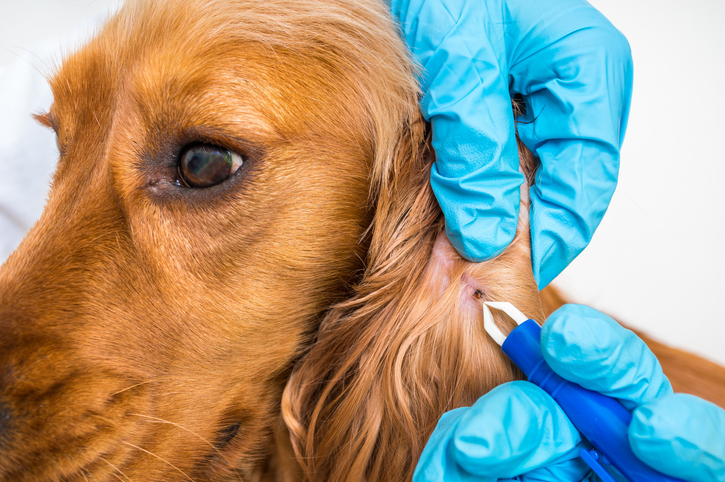The summer is a fantastic time to get outside with your dog, and cats love roaming outdoors as well. While the long days and warm weather make this a great season for outdoor fun, it also comes with a few seasonal hazards. One that pet owners need to be aware of is also one of the more difficult ones to spot: insect bites.
Both cats and dogs can be bitten by various insects, and depending on the type of bug, they may require different treatments (both preventative and reactive) to help them stay comfortable and safe. In this guide, we’ll explain everything you need to know about keeping your cat or dog safe from bites from ants, spiders, ticks, and more.
Why Do Pets Have Reactions to Insect Bites?
Just like people, certain individual animals can be more prone to severe reactions to insect bites. This is caused by an increased sensitivity to the proteins in the saliva or venom of the insect. This is why some dogs may have almost no reaction to, say, a mosquito bite, whereas others might be furiously itching themselves constantly.
Of course, some insects have bites or stings that affect nearly all animals, including bees, wasps, hornets, ticks, fleas, and certain spiders.
What are the Symptoms of a Bug Bite Reaction?
Depending on the individual pet and what kind of insect it was bitten or stung by, you can expect a few different reactions. These are, in order from most common to most severe and rare:
- Swelling or redness around the bite
- Hives
- Multiple raised, red spots on the skin
- Swelling around the face and mouth
- Difficulty breathing
- Vomiting
- Respiratory distress
- Anaphylactic shock
Top Pet-Biting Insects to Know About
Depending on your area, there may be certain unique insects that you’ll need to know about and prepare for in order to keep your pet safe. Your veterinarian will know which ones you need to be concerned about and can offer tips to help keep your pet safe.
Here in BC, there are a few insects that are the most common culprits for bites on cats and dogs. These are:
- Ants – Certain ants (especially red fire ants) are known to bite dogs. A fire ant bite is identifiable by a small, red lesion raised above the skin. Sometimes the centre will have a spot of white pus, much like a pimple. A single fire ant bite will be slightly itchy and irritating, but multiple bites can prompt an allergic reaction, causing swelling, hives, and respiratory issues.
- Spiders – There are two main types of spiders in Canada that can pose a risk to pets: widows, such as black widows, and recluses, such as brown recluses. Other spiders can bite your cat or dog, causing a raised, red, swollen lesion around the bite. Brown recluses and black widows present a serious hazard because of their powerful venom. In the hours after a bite from these spiders, your pet may begin showing severe symptoms including vomiting, diarrhea, agitation, muscle pain, and lethargy.
- Ticks – These eight-legged, parasitic insects burrow into the skin of cats, dogs, and sometimes people. They feed on the host’s blood and can pass harmful illnesses like Lyme disease. Tick bites are red, round areas of inflamed skin that may bleed slightly or scab over. Pets tend to lick or scratch at the itchy bites.
- Fleas – Fleas are commonly known as hazardous insects to cats and dogs. These tiny, parasitic bugs feed on the blood of the host like ticks, and can quickly reproduce if left unchecked. Flea bites look like small, red dots, but they’re very hard to spot under a pet’s thick fur. You can also identify fleas by finding flea dust (brown specks on the skin) or live fleas in the fur.
- Mosquitos – These infamous, blood-sucking insects bite cats and dogs just as happily as humans, and the bites look virtually the same. The risk of mosquito bites is quite low for your pets, but the itchy spots can still make your pet very uncomfortable.
How Do You Treat Insect Bites on Your Pet?
The best method for treating insect bites will vary dramatically depending on your specific pet, the type of insect bite, the number of bites, and the symptoms your pet is experiencing.
If your pet is showing any symptoms of a problem besides just itching, chewing, or licking the bites, you should take them to your veterinarian immediately. These symptoms of a severe insect bite reaction include:
- Vomiting
- Diarrhea
- Hives on any part of the body
- Excessive drooling
- Severe swelling/inflammation
- Disorientation or dizziness
- Weakness
- Lethargy
- Difficulty breathing
- Agitation
- Seizures
A veterinarian will be able to remove the stinger from the bite (if needed) and provide proper treatment or more dramatic intervention in case of severe symptoms.
If you don’t spot the above signs of an insect bite but you find the bite spots on your pet, a visit to the veterinarian may not be necessary. Here are a few tips to help your pet feel more comfortable after being bitten by an insect:
- Act quickly when you notice your pet scratching, chewing, licking, or pawing at their skin repeatedly—this is usually a sign of a bite or sting.
- If your pet was stung by a bee, try to remove the stinger by scraping the sting with a credit card. Don’t use tweezers, as they can squeeze more venom into the sting.
- Combine baking soda and water into a thick paste and apply to the site of a single bite to soothe pain and itchiness.
- Reduce swelling by applying an ice pack or a cool, wet towel to the bite sites for 10 minutes at a time.
- Prevent damage to the bite site by putting a cone on your pet if they won’t stop irritating the bite—excess licking or scratching can cause injury or infection.
- Pay attention to food and water intake to make sure your pet is nourished—offer moist food (dry food combined with water) if your pet was bit or stung near or inside the mouth.
For more care tips and guidance in the event your dog was stung by an insect rather than bitten, please refer to our article: What to Do If Your Dog Gets Stung.
As you can see, there’s a lot that pet owners need to know about keeping their furry friends safe from insect bites and stings. Having an ongoing relationship with a trusted veterinarian is one of the best ways to prevent an inconvenient bite from becoming a serious medical concern. They can provide you with options to have on hand in case of an allergic reaction, offer preventative treatments that protect from fleas and ticks, and of course, be your first contact if something’s wrong.
Creative Commons Attribution: Permission is granted to repost this article in its entirety with credit to Hastings Veterinary Hospital and a clickable link back to this page.






